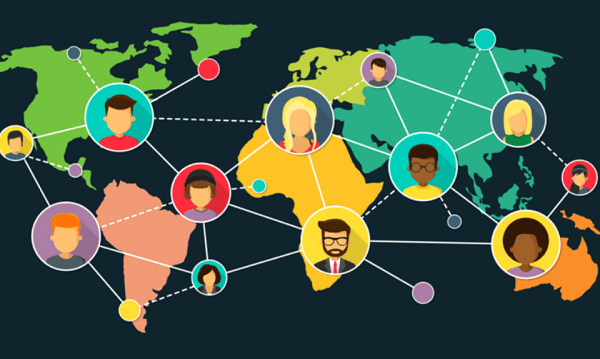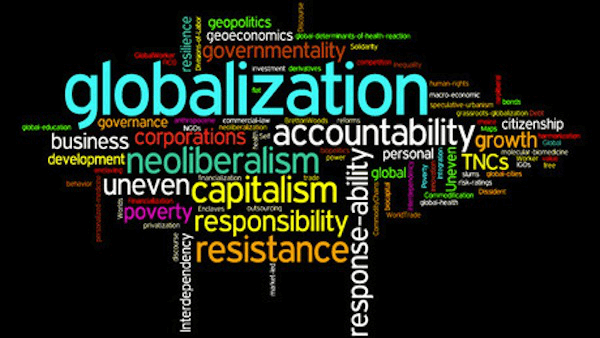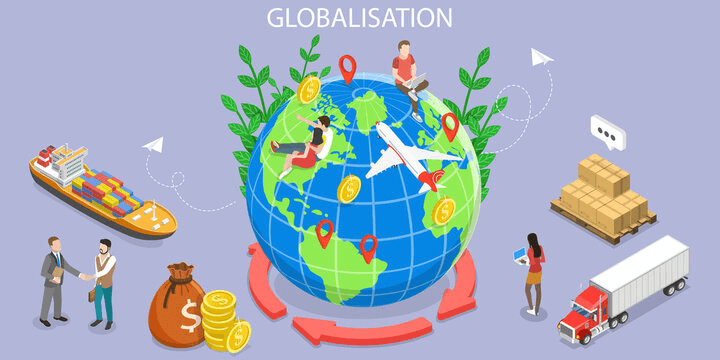Globalization EssayThe term Globalization has a wide meaning, and the actual meaning can only be understood in what context it has been used. For common understanding, the term Globalization refers to the integration of market economies and the dependency of one country on another for technology, food and another essential commodity. The term is not just limited to economic fundamentals but includes knowledge, ideas, information, goods, and services. Some scholar sees the convergence of economy and culture. It has led to sheer competition, frequent interaction, interdependencies and integration among countries. The world has become a single village, and the boundaries have become porous. The more nations engage with each other, the more globalized the world. 
The Working Mechanism in the GlobalizationTrade plays a pivotal role in Globalization. A country gains specialization in some technology, which becomes an advantage for that nation. It helps big corporates and manufacturing plants access cheap raw materials and parts. Companies also benefit by having a low-cost, efficient, cheap labour force from foreign countries. Apart from labour, the companies access huge markets for selling their products. Some policies that drive and boost Globalization are open borders, international cooperation, and free trade. With the development of Information Technology and emerging trade routes, the exchange of money, products, information, material and people has become more rapid at a massive scale, and it has also accelerated the process of Globalization. People call the advancement in transportation and communication telecommunications. Recent technologies which have emerged and have played a key role are:
Significance of Globalization
The importance of Globalization is immense and paramount for any developing and developed economies, as they are closely interlinked. If any mishap happens in the world, the tremor is felt by every country. It directly affects people's interactions and behaviour in businesses. It has become more intense in contemporary times and directly affects people. It also affects the global supply chains, trade relations, and access to labour markets and natural resources. Globalisation also has an important role in the promotion and facilitation of culture and the exchange of ideas. It eliminates geographical and trade barriers which were earlier present. It is not just a limited economic barrier; it also affects the political barrier. As governments are shedding away from trade restrictions, the globalised world is becoming more competitive, and the search for cheap and efficient raw materials and labour has intensified. Increased competitiveness spurs innovation and also accelerates migration resulting in intermixing of cultures. Prices of commodities are also affected positively and negatively in both ways. History of GlobalizationPre-World War 1: The European nation put a huge sum of investments in overseas countries before World War I. The period from 1870-1914 is termed the golden age of Globalization. Post World War II: The United States took the initiative to establish a world economic system and created accepted international guidelines. Premier and Multinational institutions like International Monetary Fund, the United Nations, the World Trade Organisation, and the World Bank came into existence to promote free trade and international cooperation. Silk Road Trade: This trade route dates back from 130 B.C. to 1453 A.D. It had seen another wave of Globalization. Travellers, goods and merchants were brought back from China via the Middle East, Central Asia, and Europe. The Roman Empire: It's legacy dates back to 600 BC and influenced the economic and governing system in major portions of the ancient world for decades. Globalization became prominent in late 1980 as the world witnessed major technological advancement and increased interaction among international communities. The launch of the personal computer and inventions and the evolution of the Internet in the modern era have been the driving force of Globalization, commerce and international communication. Since the mid-20 century, Globalization has slowed as the nations emerged from the horror of colonies and became independent. Since they were recently born and not equipped with the latest technology to compete with developed companies, they went with an aggressive and intense protectionism policy and closed all imports. They did not allow foreign products into the country. Immigration was slow in this time frame as many nations went through national movements. Even the recent Covid-19 had slowed down the process of Globalization, and disruption of the supply chain had sent tremors to the vulnerable countries as most of the countries had gone into lockdown, but the process of Globalisation saw a dramatic and exponential increase with the end of the 20th century as the Globe was witnessing several major transformations in the field of science and telecommunications technology. This development broke all the trade barriers and geographical barriers. Role of G-20 Nations
It is a grouping of 20 major powerful economies to foster boost international cooperation by addressing global economic challenges, for example, climate change and financial stability. The G-20 countries comprise 19 countries and the European Union, the most powerful economy. The statistics say that 80% of world GDP, 60% of the population and 75% of global trade exist between countries. G-20 came into existence in 1999 after the 1997 financial crisis and held a summit and meeting every year. The heads of state and governments have been participating in the summit, gracing the occasion, and deliberating on key economic issues and opportunities. Presidentship is given on a rotation basis, and the President's home country becomes the host of the next annual G-20 meeting. Osaka in Japan hosted the 2019 G20 Annual Summit, and it deliberated on issues like women empowerment, artificial intelligence, and climate change. Riyadh in Saudi Arabia conducted a summit in virtual mode as the Covid-19 pandemic was raging in the world and the world was in partial lockdown. Riyadh G20 Summit discussed issues like women and youth, safeguarding the planet, empowering people, benefits of technology and innovation. They have recently concluded the 2022 G20 Summit in Italy in Rome and discussed the post-covid-19 world and enraging climate change. The participants of the G20 members are India, the United States, Canada, Mexico, Brazil, Argentina, Saudi Arabia, South Korea, China, Italy, Australia, France, Germany, Russia, Indonesia, Turkey, Japan, South Africaand the European Union. Spain has given the status of permanent guest in the grouping. Forms of Globalization: Cultural, Economic and PoliticalScholars and Experts have divided Globalization into three forms: Political, Economic, and Cultural. Cultural Globalization: It stresses societal and technological advancements becoming a driving force of converging cultures. Some driving factors are deep penetration of social media, seamless communication channels and accessible modes of transportation. Globalization on Economic Front: On this front, the focus point is enhanced integration of the international financial market in tandem with a financial exchange. One key recent development accelerating Globalization is Free-Trade agreements between North American and Trans-Pacific nations. Multinational Corporations will play a significant role in economic Globalization. Political Globalization: Policies of international organizations like the United Nations, International Monetary Fund (IMF), World Bank, and World Trade Organisation are pushing the governments to open up their border and reduce trade barriers. There has been a continuous effort to reduce import taxes and set norms for international trade. These three forms influence each other. For example, Liberalized trade policy will accelerate economic Globalization, and political decisions directly influence the cultural tradition of the people. Scholars point out that imported goods directly influence the cultural behaviour of society. Globalization Effects on the PeopleThe process of Globalization has touched every common person, and it can be felt globally and locally. Individual: A lot of international factor affects the common person, and Globalization directly affects the accessibility of goods, supply-chain mechanism, and Global inflation have a direct impact on common people. Communities: Globalization affects the communities and cuts across the local or regional organizations, economies and businesses. Globalization also affects the cultures which have developed in the communities. Institutions: National Governments, Multinational corporations and various organizations such as universities and colleges are all influenced by Globalization and its approach. Examples of GlobalizationSome of the easily visible presence due to Globalization is the setting up of Multinational Companies, and they are: Amazon: It has recently emerged largest multinational company cross-cutting the nation's boundaries. This conglomerate employs approximately 1.3 million part-time and full-time employees. McDonald's: This restaurant chain has 39,198 food outlets spreading across 119 nations and territories stated to the Securities and Exchange Commission. The outlets employ more than 2.2 million people under it. The hosting countries hope to bring social and economic development through these conglomerates. It generates wealth, skills and jobs as these major companies invest huge sums of money, but there is another side of the coin. It slowly destructs local businesses and vendors, exploits the labour force and interferes with the tradition and local cultures. Fruits of GlobalisationGlobalization helps gain access to cheap natural resources and skilled and semi-skilled labour. MNCs (Multinational Companies) use these opportunities to enhance their low-cost production activities and sell this to global markets. Some of the fruits of Globalisation are:
Side-Effects of the GlobalizationCritics point out that it accelerates economic inequality, and MNCs companies try to assert themselves and interfere in the internal matter of the state. Some of the emerged issues and challenges due to Globalization are:
Frequently Asked Questions on GlobalisationQues: What do you understand by Globalisation? Ans: Globalisation means integration between nations through Foreign investments and foreign trade by big corporates. Migration of people, Private and Public investments from foreign countries and an increase in foreign capital flow contribute to globalization. Mass improvement in technology, pressure from International Organisations, trade liberalization, and flexible investing policies largely help in the process of Globalisation. Ques: In what ways the flexible labor laws promote Globalisation? Ans: Flexible labor laws help companies to gain more foreign investment. It helps Industries to hire a worker for a short period rather than regularly. Companies can suspend employees depending on market conditions and negotiate salaries and wages according to their conditions. Ultimately, it enhances competition and reduction in labor costs. Ques: Why did the Government of India adopt protectionism policies after the Independence? Why did they remove all trade barriers after 1991? Ans: The Government of India had adopted protectionism policies because they had just come out from the shackles of colonialism, and there was abject poverty. The companies had just started emerging, and Government wanted to protect them from foreign competition. The Government, at that time, thought that these companies would not be able to survive with the foreign competition. They require some time to develop and become capable of giving the fight to foreign players. However, in 1990, the Government of India changed its economic and trade policies dramatically. The Government believed that sufficient time had been given to the Industries to grow up. They introduced the policy of liberalization, privatization, and Globalisation. Ques: Why the fruits of Globalisation have not been uninformed? Ans: Fruits of Globalisation have only reached the rich and developed countries. Developing countries have always been the source of raw materials, cheap raw materials, and the setting of manufacturing units. Developing countries got few benefits from this idea. Globalization has destroyed Medium, Small, Micro, and Medium enterprises, as the Giant MNCs pose sheer competition to the small industries. All the profits earned by the MNCs go to developed countries. It has almost vanished the concept of Job security. Ques: How does the policy of liberalization complement the process of Globalisation? Ans: Liberalised trade helps the process of Globalisation in the following ways:
Ques: How has the process of Globalisation led to the integration of markets across the Globe? Ans: Due to advancements in shipping technology, now the manufacturer can send its goods to different markets present in the world. Intense competition helps the prices of products to fall sharply. It has also benefitted the buyer as their choices of products have increased. Sheer competition has also reduced the prices of the product. For example, the Indian market is flooded with various smartphones, and it has given consumers various choices. Ques: What are the advantages of Globalisation? Ans: Advantages of the competition are:
Ques: Why do developed countries force developing countries to open their markets fully through International organizations like International Monetary Fund, World Trade Organisation, etc.? What do developing nations ask in return? Ans: Developed countries pressure developing nations to fully open their market so they can dump their products and establish their industrial units in developing nations to get cheap labor, low taxes, and sources of raw materials. Manufacturing cost is very cheap compared to developed nations. Developing nations have, in return, asked developed countries to open their markets so that their products could be exported to their markets. Ques: What are the limitations of Globalisation? Ans: Some of the limitations of Globalisation are:
Next TopicMy Dreams Essay
|
 For Videos Join Our Youtube Channel: Join Now
For Videos Join Our Youtube Channel: Join Now
Feedback
- Send your Feedback to [email protected]
Help Others, Please Share









